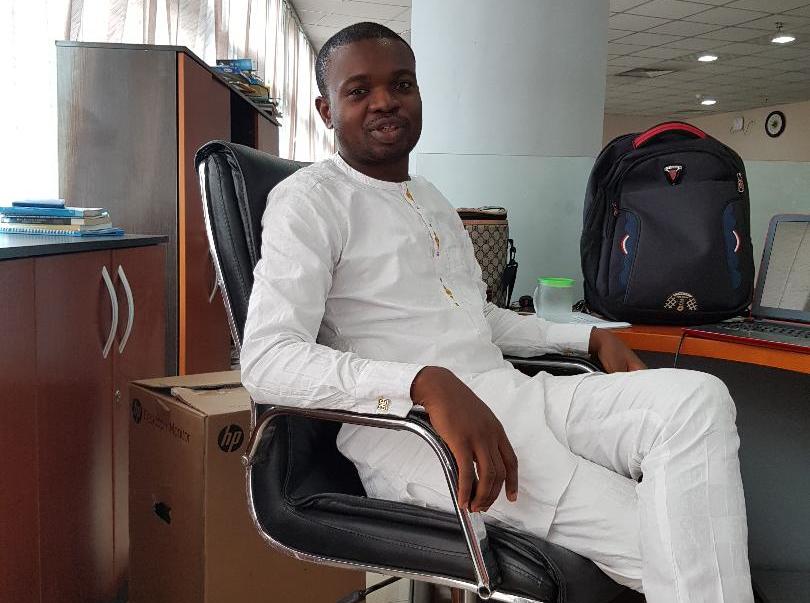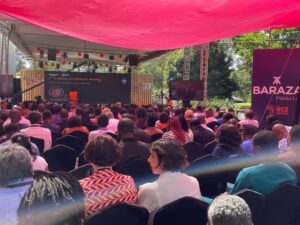Alade Abiodun recently clocked four as Online Editor of Daily Trust. In this Online interview with Lekan Otufodunrin, Abiodun recalls how he got the job, his experience and thoughts on maximising online publishing by media organisations and individual journalists.
Congratulations on your fourth job anniversary at Daily Trust. Can you recall how you got the job?
I can’t recall vividly now but I think you shared it on your Facebook page or in a Whatsapp group and I decided to share on my page and with some contacts directly as well. As at that point I was not interested in the vacancy. I encouraged some friends to apply.
However, as fate would have it, on the final day of submission, an event happened at my former place of work and I told myself ‘this is the time to leave and embrace a new challenge’.
On my way home that day, I started thinking about available opportunities, then, I recalled that I have shared the link with some friends. I traced the link and submitted my application late in the night. In fact, I used my old CV with little editing.
With God’s grace, I was called for the interview and from that day, the company wanted me.
What were some of the main issues you had to convince the interview team about your suitability for the position?
Sincerely, I don’t know the main issues that convinced the panel, but I knew I was going to get the job from that moment. I felt I was convincing enough and from the engagement during the interview, I was confident I have gotten the job.
I think my experience was useful. I had worked with the Online unit of The Nation and Vanguard newspapers, at a time Vanguard was number one in Nigeria. I wasn’t just a member of the team at Vanguard, I was managing the social media, pioneering some events that grew the audience base and reach. And in my little way, I was assisting the Editor. My records were there and verifiable.
I also did my research about Daily Trust before the interview so I was able to proffer some solutions to the challenges of the digital platform. And I think the company needed someone with fresh ideas, which I offered.
I was young – in my twenties but not a greenhorn and the panel appreciated this. I had worked in print and broadcast media, attended digital training, had my first degree in Journalism from Lagos State University and my second degree in Mass Communication from the University of Lagos among others. I had also worked with some of the known editors in the industry.
On reflection, what in your previous work experience prepared you well for the higher assignment?
I have had the privilege of working with at least three national newspapers and great editors before the interview but I think my days at CITYMAIL, a Lagos-based publication by Mr. Muyiwa Adetiba, with Mr. Isaac Umunna as the Managing Editor were really helpful.
During my days at Citymail, I covered virtually all the beats – Court, Education, Crime, Business, Entertainment, Sports, Politics, Features and others. It broadened my knowledge about all the beats and I needed that knowledge as an editor. I also worked with different editors during that period so I understood different styles of writing and editing. Although, it was very demanding as at then but very helpful in my career progression.
I am also lucky to have worked with some of the known names in the industry. From all my editors, I learnt a lot. I was fortunate to have been blessed with great leaders and editors like Mr. Lekan Otufodunrin, Jide Ajani, John Abayomi, Semiu Salami, Steve Ayorinde, Austinfair Nwalu, Ms Comfort Umanah of AKBC, Victor Enyinnaya among others.

Did you have concerns about relocating from Lagos where you were based to Abuja?
I did all my schooling in Lagos, so, I am a proper Lagos boy. Fortunately for me, in the course of my work, I had visited almost all the states (especially their capitals) in Nigeria. I think as at then, I had visited 32 states and the FCT. It was only Borno, Adamawa, Taraba and Yobe that I had not visited as of 2016.
I needed a change from Lagos. I wanted a more serene and saner society, devoid of traffic and noise. Abuja offered that opportunity, though, the city looks ‘slow’ at the initial stage but it is a good place to live.
My major concern was how to adjust to the new environment and start afresh. I was also leaving my friends, a work environment I was used to but I felt I needed another challenge.
It changed some of my plans but in all, I saw the hands of God leading me. And with that knowledge, it was pretty easy and He has been faithful.
Four years on the job, what have been the major accomplishments of your team?
This is difficult to answer because I don’t want to blow my trumpet but there have been changes. I believe we have changed the narration and people perspective about Daily Trust, especially in the digital world. If you know where we are coming from, you will appreciate where we are.
In the digital space, we have also pioneered some innovations among major online publications in Nigeria. Importantly, the quality of our product has improved.
All the metrics of assessment- page views, ranking, revenue etc have improved but we are aiming to do more. And the main focus is not to be the number one in Nigeria but Africa.
But what I will consider my major achievement is the number of my former team members that are now in leadership positions, championing new courses in other publications and industries. It is important to build others and I believe it is one of the hallmarks of leadership. I am happy that we grew to that level where we had so many leaders within the group. Now, we are building another set.
How easy has it been ensuring a total digital convergence with the traditional newsroom in your organization?
There are challenges but Daily Trust has a template on this and it has been helpful. However, some of our reporters still write with the newspaper in mind, they are yet to fully embrace the digital world.
But the truth of the matter is that we have made the platform big that they want their stories on the digital platform because they can see the impact and interaction. So, it was important to let them see the value and why they needed to embrace the digital platforms.
Nowadays, media houses recruit multimedia journalists and let them know from the interview session that if successful, they will be working across platforms.
What is your advice for journalists on how to become digital compliant in their media practice?
We are in the digital age and we have to embrace this powerful tool, which is very helpful to our profession. They should take advantage of available resources and trainings.
We should go beyond the ‘reported speech’ journalist. With our smartphones, we can do much more. You don’t have to own all the big gadgets but make use of what you have.
It is also important to state that with the help of tutorial on Youtube and available resources online, you can be a good multimedia journalist. You just need to be open-minded and willing to practice what you learnt.
READ ALSO: What Online publishers must do to survive – Soyombo- ex-Cable, ICIR, Sahara Reporters editor
How can journalists better maximise online opportunities?
The opportunities are limitless and we need to embrace them. But understanding purpose is key and willingness to adapt to changes. There are many opportunities but how prepared/relevant are you?
I will always advise journalists to study emerging trend and prepare themselves for them. International organisations and publications are releasing reports relevant to the digital world, check how to domesticate them where you are. Create a niche or get an area you are interested in and become the boss but today, I see everybody running after general news; sadly, they ended up as ‘copy and paste’ journalists.
How well are Nigeria media organisations doing digitally compared to other African countries?
We are not doing badly but we can do far better. I think South and East Africa are doing far better than us. For instance, I am not sure there is any outlet in Nigeria that has the reach of The Nation of Kenya.
We have the population. The number of internet users in Nigeria is put at above 96 million, with a projection of 152 million by 2025, but what percentage of this population is visiting our platforms?
The top five newspaper websites in Nigeria are Punch, Vanguard, The Nation, Guardian and Daily Trust, I am not sure that our combined page views is better than Legit (Naij). What has Legit done that we can’t do? These guys started as aggregators but look at where they are today. They have been able to prove that digital space remains an untapped field in Nigeria. They came with a business model, created a niche and are doing well today.
Sadly, most of us are trying to catch up today but are we ready to make the right investment, not just investment but the right one. Today, we still have some big digital platforms that have failed to empower their reporters with needed tools. Online reporters are treated as second fiddle in most media houses. We deploy any reporter that is not doing well in the newsroom to the online unit. We are not going to get there with that mentality.
And another challenge is that most publishers want a quick return from the digital unit. It is true that some people made quick money from it but that was years ago and they were more like pioneers when people had fewer choices but today, there are over a hundred thousand digital platforms in Nigeria. So, you need to invest, develop a unique model, get the right team and give them all the needed support to grow.
I have facilitated some training and you hear the publisher talking about return within six months and when they don’t get it, they close shop. And for the big media houses, many don’t know what they want. Today, they want the platform to look like New York Times, next tomorrow they want it like a news platform in South Africa because someone from that country facilitated a conference they attended. It wouldn’t work that way.
There are big platforms today that you have only one or two reporters and the Online Editor, who is poorly paid compared to other editors. You want him or her to work seven days a week, produce multimedia contents, break news and give you an error-free publication. No deputy, no sub-editors, video editors etc, it will take magic to get the right value.
Sincerely, I think most publishers (especially those that have print edition) are reluctant to embrace this shift because of the fear that it is going to kill the newspaper, which I don’t think will happen soon. I believe with the right strategy; the print will gain more with a good digital presence in Nigeria.
What is your advice for online publishers based on your experience as an Online Editor in a major media organization?
There are two sets of publishers here – those that are publishers because they own a website and the main publishers.
To the first set, I will appeal that they need to look into the issue of ethics. It is important that we safeguard this profession and not murder it on the altar of immediate pleasure and self-aggrandisement.
To the second set, I will counsel that they don’t make your digital platforms a dumping ground for your newspaper (for those that have newspapers), you will kill the newspaper and make the online platform unattractive. I am not saying don’t publish what you have in the paper online, but don’t turn it to a dumping ground; let your digital platform be distinct from the print.
My second counsel is that this venture is capital intensive – you need to recruit the right people, support them with the right equipment and environment to thrive. Develop a good business model because there is money to be made but you can’t depend on only Google Adsense. There should be a business team supporting the editorial team.
We are not maximising the opportunities available. We have the opportunity to create online radio, TV, Podcast, Video on demand, webcast among others but what are we doing? Posting contents written for newspaper audience on our website.
How can media training organizations better prepare students for the industry considering the changing landscape?
During my days in schools, I was told that new media is the future. The truth is that the future started yesterday. Every institution must embrace the new media and prepare their students for the future. Students should be trained to be relevant in the future, not recycling what generation before they were taught, using 1958 media resource materials to train 2020 students when they are not studying history.
As a student of journalism, I made use of typewriter during one of my courses but that is no longer relevant today. Training organisations must go digital, train multimedia journalists. Nobody is willing to employ anyone that can’t do more than text today. You should be able to use a camera, have an idea on video editing, audio production among others. They should be trained on how to write for the global audience.
Students should be encouraged to own a good digital presence.
Any other issues you want to draw attention to?
We need to find a way to address the issue of fake news. Training institutions and media practitioners need to develop an effective way to address this, so we don’t lose our relevance.
We also need to discourage ‘copy and paste’ journalism. What we have today has gone beyond plagiarism. Some blogs and websites will copy your story verbatim, including the image and other materials without attribution/link back. It is intellectual theft to copy any material without getting express approval. We can’t continue like this and the earlier we realise and act on this, the better for the industry. With the right policy, it is another source of revenue that major players have to look into.







Sakibu Olokojobi
Good job. Well done.
Wale Ojetimi
Great stuff. Good job
Mohammed Ahmed Yabagi
Thank you for this insightful interview. I learnt a lot.